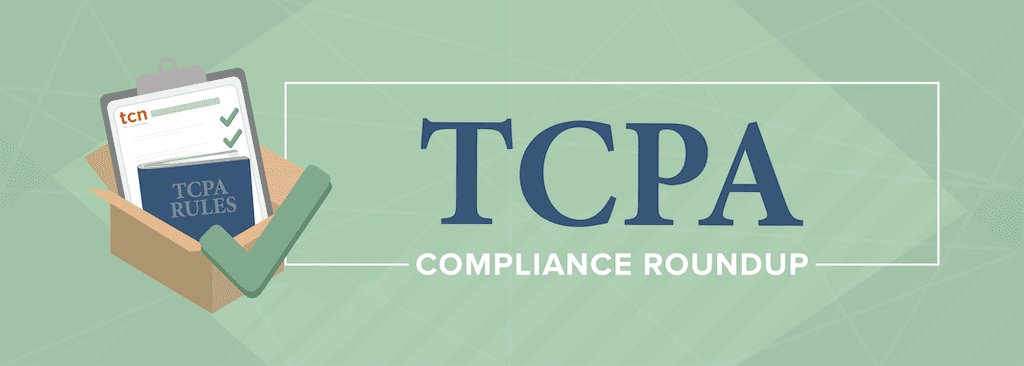TCPA Compliance Roundup: Spring’s Hot Cases
Every day, the U.S. federal government enforces thousands upon thousands of regulations that impact virtually every industry. Debating which industry suffers more for excessive regulations could be a worthy thought experiment. But, call center executives and managers know it’s hardly a debate…
Adhering to industry regulations is a daily reality for executives and managers.
Fear of severe penalties demands they are always vigilant. Managers can thank the Telephone Consumer Protection Act (TCPA) and its many amendments to that.
In late 2019, Congress passed the TRACED Act, further increasing regulations.
It’s a fact: TCPA compliance is a top priority for every long-term thinking executive and manager.
Recently, many federal legal cases have challenged parts of the TCPA. Debates around TCPA are heating up.
Sure, it’s hard to follow these consequential developments. That’s why today we’re breaking down some of Spring’s hottest cases and what they mean for the call center industry.
Gadelhak v. AT&T Services, Inc. – What Constitutes “Human Intervention?”
While call center executives and managers are used to increasing regulations and additional TCPA compliance measures, they recently received some good news.
In late February 2020, The Seventh Circuit Federal courts limited the definition of an automatic telephone dialing system (ATDS) in Gadelhak v. AT&T Services, Inc. The ruling concurred with previous decisions by the Third and Eleventh Circuit courts.
The plaintiff, in this case, charged that AT&T used an ATDS to text message him without his prior express consent.
This particular case required a thorough study of TCPA’s definition of an ATDS and its differing interpretations in case law through the years.
In brief, a majority of courts have ruled that an ATDS can dial numbers without human interventions, which matches TCPA language. But that hasn’t stopped some courts from differing on two fronts.
Is an ATDS defined as a system able to generate dialed phone numbers randomly or sequentially, or is it a system that dials from a list of targeted or stored numbers?
Gadelhak v. AT&T Services, Inc. provides some legal defense for call centers that use enhanced outbound calling systems to connect with customers and prospects more efficiently.
Now, the Seventh, Third, and Eleventh Circuits court rulings differed from a previous Ninth Circuit court ruling. This means the Supreme Court may need to settle this disagreement for greater legal clarity eventually.
Rogers v. Postmates – What is “Vicarious Liability?”
Recently, a federal court decided another TCPA compliance case involving an ATDS and the question of “vicarious liability.”
In Rogers v. Postmates, the plaintiff (Rogers), alleged that Postmates, a $billion U.S. courier service company that delivers food and drinks, sent unauthorized texts to him and other Floridians using a third-party service.
The text promised $25 an hour to the plaintiff for delivering items in the Fort Lauderdale area.
In the end, the Ninth Circuit Federal court ruled that the plaintiff had no factual allegations concerning Postmates’ specific control over this particular injury-causing action.
In other words, the plaintiff presented no evidence showing Postmates’ hired a third-party texter to send these texts. The plaintiff did not show the alleged third-party had access to Postmates computer systems, data, or copyrighted materials either.
That last part is critical in determining if a product or service seller should be held liable (through vicarious liability) for any hired third-party marketer’s unlawful action.
This case is particularly essential for call centers’ relationships with companies that outsource marketing and customer services to them.
Managers ahead of the curve will use the odd legal nuances of The Rogers v. Postmates and Gadelhak v. AT&T Services, Inc. rulings to brush up on their TCPA basics.
Barr v. American Association of Political Consultants, Inc. – Does the Federal Government Get a TCPA Exemption?
What happens when those responsible for enforcing TCPA compliance (the U.S. Federal Government) violate the TCPA itself? Does it violate the U.S. Constitution?
That question is at the heart of Barr v. American Association of Political Consultants, Inc., which the Supreme Court hears in June 2020.
Back in 2015, Congress amended the TCPA through its Bipartisan Budget Act of 2015. This granted the Federal Government the ability to use ATDS to contact cellphone numbers without prior express consent.
This “government debt exemption” is used by the Federal Government to recover owed money.
In April 2019, the Fourth Circuit federal court ruled to strike down this government exemption since it authorized the government’s usage of the same automated, intrusive calls it passed TCPA to stop. The court also found it violated the privacy interests of call receivers.
Sure, Barr v. American Association of Political Consultants, Inc., doesn’t have a chance of changing TCPA fundamentally.
But it will be satisfying for any manager, who continually sweats TCPA compliance, to see the government potentially lose its exemption.
It’s Never Too Late – Learn How to Rapidly Increase Call Center Compliance Faster Than You Think
Jumping on the merry-go-round of TCPA litigation, even for a moment, is enough to make any executive or manager dizzy.
And call center leadership only has so much time to stay on top of these rapid developments.
After all, they have to perform vital jobs in running call center operations, which many people rely on – agents, customers, and shareholders. All while remaining in total TCPA compliance to preserve that opportunity to serve.
So it’s about time call center leadership had a smart compliance solution that saved their operation time and money.
A solution that they could implement right away to improve towards total compliance now and for years to come.
That’s why TCN put together “The Managers Guide to Call Center Regulations,” a free guide that every manager needs right now.
Download the free guide right now to get up to speed on everything TCPA compliance-related and beyond!
